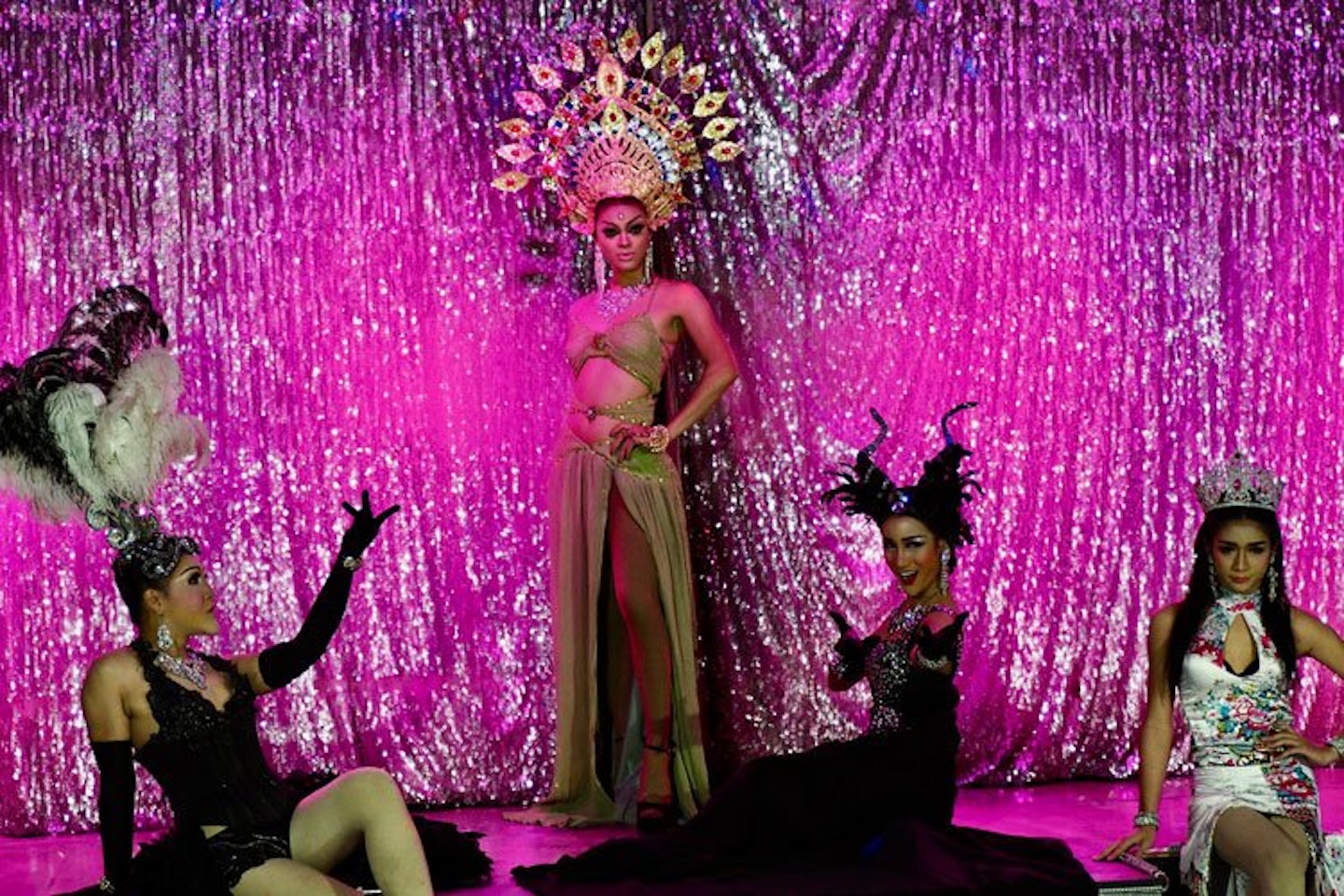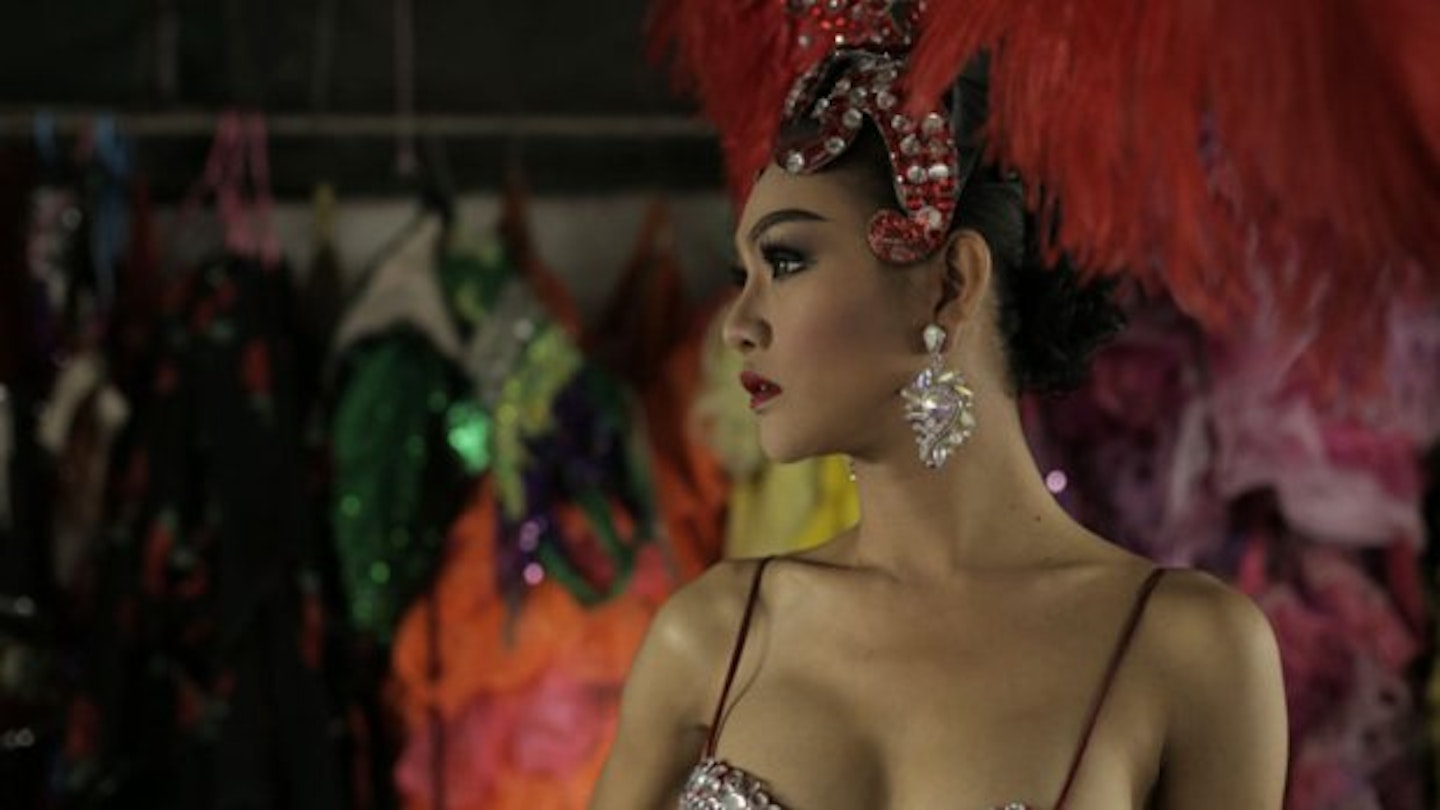I arrive at the Chiang Mai Cabaret – also known as ‘the ladyboy cabaret’ (their description not mine) – to be greeted by the manager, who is wearing a striking red dress, complete with ‘Miss Chiang Mai’ sash and tiara. We’re escorted to our seats at a table near the stage. Music pumps from the speaker system and as the audience gradually arrives I realise that I can’t see a single Thai face among the crowd, save for my mate Sar, who is busy ordering drinks and taking selfies with Miss Chiang Mai.

To begin with, the show is relatively tame. The performers are talented, and their impressively diverse repertoire of acts ranges from Bollywood hits to an 18th century fan dance in full period costume. One guy in the audience can’t seem to stay seated. Wearing a wife beater and covered in UV paint – like he’s just come from a full moon party – he grabs at the performers as they come off stage and starts mouthing off. His girlfriend tries to shut him up by pouring beer down his throat.

The show picks up as ‘Rihanna’ – the likeness is uncanny – takes to the stage to perform ‘S&M’. She pulls men from the audience, straddles them and gyrates. Her co-performer, dressed as Britney circa My Prerogative, starts grabbing men by the crotch. Guys push their mates forward in stag party style ‘hilarity’, reminiscent of that scenein The Hangover Part II (if you haven’t seen it, don’t bother), in which one of the main characters, Stu, is filled with horror when he realises he hooked up with a transgender woman in Bangkok the night before, to the great amusement of his friends. Lads lads lads. And this was a film that came out in 2011, people.
There are more poignant moments too (at the Chiang Mai Cabaret that is. There are no poignant moments in The Hangover II). A woman takes to the stage in profile, obscured by the curtain, and then turns to reveal that she’s dressed half as a woman, half as a man, enacting both parts of the performance. It’s mesmerising.
Estimates as to the number of ‘kathoey’ (literal translation: ‘ladyboy’) living in Thailand range from 10,000 to 300,000, according to Transgender Asia, but even at 10,000 this is still proportionally higher than other parts of the world. Trans men – know as ‘tom dee’, or tomboys – are reportedly less common – and definitely less visible (tom dee aren’t necessarily transgender either).

Miss Chiang Mai is clearly marketing-savvy – I have no trouble getting in to speak to the girls the next day. I’m ushered into the dressing room as they get ready, while she keeps a watchful eye in the corner.
I ask 25-year-old Dreamy how she feels when people call her a ‘ladyboy’. She – and the other girls – find this an odd question. ‘In the USA they say transgender; in Thailand ladyboy, but I think it’s the same’, she replies. Kathoey, like the ‘hijra’ in India, have been a part of Thai culture for thousands of years. As such, public acceptance is greater than in many other countries, in as much as people are used to seeing transwomen, so are less likely to point, name-call or stare. I ask Annie, 24, whether people are ever disrespectful. ‘No’, she replies, looking at me quizzically. ‘Well, in the UK’, I mumble, ashamed, ‘sometimes transgender people get called names…’ ‘Why?’ she asks, genuinely incredulous. I give an unsatisfactory response about people being afraid of those whom they deem different from themselves.

Annie tells me that she’s always known she was a woman, but this initially caused some friction with her dad who wanted her to be a Thai boxer. Similarly Dreamy, who dressed as a girl from aged five, remembers playing ‘with girls not boys’. ‘Boys would say “come play football” and I would say “no! I play volleyball; play with the ladies”’, she tells me. ‘But can’t girls play football too?’, I ask. She laughs.

Annie and Dreamy credit a beauty pageant called ‘Miss Tiffany’s Universe’ with aiding mainstream acceptance of trans culture in Thailand. According to the Wikipedia page, Miss Tiffany’s Universecontestants ‘are judged based on physical attributes and overall performance in accordance to the feminine ideal’. When it comes to the feminine ideal, clearly I’m a bit of a disappointment. As we pose for a photo, the girls laugh at my British awkwardness. ‘Do sexy pose!’, they demand. Clearly the fact I’m not a sexy selfie pro is evident. ‘Don’t worry – we will show you’, they insist.
Appearances can be deceptive. Take Dreamy, for instance. As well as having taught herself English ‘using Google translate’, she has a joint honours degree in Japanese and Dramatic Arts from Chiang Mai University, one of the best regarded institutions in Thailand. Meanwhile 20-year-old Pi is studying Thai Dancing, and 24-year-old Annie is majoring in Communications and Public Relations. ‘I take care of myself’, she tells me, ‘for everything – for rent, for home, for pay for study. I don’t need money from my parents’. Her dream is to work in marketing for a European company, she tells me.

Sadly, this is a dream she may never realise. Although transgender rights in Thailand have improved since the passing of the Gender Equality Act in 2015, designed ‘to quell discrimination against LGBTI communities in Thailand’, women like Annie still have problems travelling because their gender remains male on passports and official documents. ‘They have to check our visa and the visa says Mister’, Annie says. ‘It’s not easy’. Research from The International Labour Organisationinto gender identity and sexual orientation in Thailand found that ‘especially during private or business travel without official invitation letters, transgenders are commonly detained by immigration and face questioning under suspicion of using a fake passport’. This can significantly restrict and reduce employment opportunities.
Thai trans people also experience other forms of workplace discrimination. When I ask 23-year-old Nicky –‘Rihanna’s’ IRL foil – about this, she initially tells me that ‘it’s easy to find work for ladyboys’. But when I push her – ‘how about if you want to be, say, a doctor or lawyer or politician?’ – her response is quite different. ‘That would be difficult’, she replies quickly; ‘yes, that would be tough!’ According to the same ILO study, in Thailand transgender people ‘are often excluded from mainstream jobs, especially in the civil service… They are routinely asked about their sexuality in job interviews and subsequently denied the job’. As a result, the majority of trans people ‘including those highly qualified, have no other choice than to earn a living by engaging in limited stereotypical jobs such as cabaret performer, make-up artist, or in cosmetic sales and public relations’. For trans women in rural communities it can be even harder.

The girls tell me their love lives are affected too. ‘It’s more difficult to find a boyfriend’, Nicky says; she explains that as much as there is outward acceptance, there is persisitent underlying stigma ‘it’s so hard to find someone who can accept and fall in love with a ladyboy’. Pi agrees. She doesn’t speak English, so Sar translates: ‘When a guy fancies her they really like her, but then when his friends know she is a ladyboy no one feels comfortable. Then they break up with her’.
Towards the end of my visit I’m taken into the ‘boys’ changing rooms’. This group dress as men in the daytime, Sar explains, and women in the evening. ‘It’s their dream to be here and they love to dress up and be like a woman’, she translates. I ask if they see themselves as male or female. They find this very funny. ‘They say all they know is “I like men!”’, Sar translates. I ask if they have boyfriends. They nod. ‘And do they present as male or female with their boyfriends?’ ‘No worries’, they reply, having understood my question in English, ‘doesn’t matter!’

Sar interjects, ‘these two’ [pointing at a Tina Turner lookalike and another performer] ‘are husband and wife. They switch roles, sometimes one it the husband and the other is the wife and vice versa’. Could we learn from the greater acceptance of different gender norms and roles in Thailand? We could certainly learn a few things from all of these performers, but acceptance isn’t the same as equality – far from it – and when it comes to equality Thailand, like most of the world, still has a long way to go.
You might also be interested in:
'2016 Was The Year I Took On Transphobia In The NHS - Here's Why'
Follow Florence on Twitter @Flo_Wilk
This article originally appeared on The Debrief.
